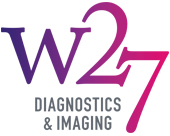A frozen shoulder – referred to as adhesive capsulitis of the shoulder – is when the shoulder becomes stiff and painful without any obvious cause. It normally affects only one shoulder, which can become so stiff and restricted that its movements are effectively ‘frozen’. The exact cause of frozen shoulder is not known. Experts believe that scar tissue develops inside the shoulder capsule lining the joint. This causes the capsule to thicken and contract, limiting movement of the shoulder. What causes scar tissue to form in the first place is not understood. Occasionally a frozen shoulder follows a shoulder injury but most cases are not linked to injury.
Symptoms of frozen shoulder
The symptoms of frozen shoulder include pain, stiffness and a loss of movement in the shoulder. Frozen shoulders typically have three distinct phases:
- The freezing phase – this normally lasts two to nine months. The shoulder becomes increasingly painful and stiff and it is particularly uncomfortable to lie down on the affected side.
- The frozen phase – this normally lasts four to 12 months. During this phase, the pain gradually lessens but stiffness may worsen and it may be impossible to rotate your arm. The muscles in your shoulder may become weaker through lack of use.
- The thawing phase – this is the recovery phase and it can last between one and three years. Pain and stiffness gradually lessen and movement in the shoulder returns to normal although it may not recover completely.
If left untreated, a frozen shoulder may last for several years – on average it takes between two and three for the condition to resolve itself. A frozen shoulder can have an impact on almost every aspect of life including getting dressed, sleeping and day to day tasks like driving.
Who is affected by a frozen shoulder?
Frozen shoulder is more common in women, particularly between the ages of 50 and 65. People with diabetes are slightly more likely to be affected. Most commonly it is the non-dominant shoulder that is affected.
Hydrodilatation treatment for frozen shoulder
A frozen shoulder is painful and debilitating but there is no need to suffer in silence. As specialist radiologists we offer an effective treatment for the condition called hydrodilatation.
This is a type of injection containing:
- Steroids and local anaesthetic to relieve pain and reduce inflammation.
- And saline solution to help to stretch the scarred joint capsule from the inside to break down scar tissue and improve range of movement.
What to expect during hydrodilatation treatment
Hydrodilatation is a quick procedure that takes around 25 minutes from start to finish. You will be asked to lie on the X-ray table while an X-ray of your affected shoulder is taken.
After cleaning the skin with sterile solution, the radiographer will inject you with local anaesthetic to numb the skin over your joint. Once numbed, a needle is slowly advanced into the joint and the syringe removed. Dye is injected to confirm that the needle is correctly positioned in the joint.
Next, a mix of steroid, local anaesthetic and saline is injected. Your shoulder may feel tight or there may be a sensation of pressure inside the joint which is completely normal. Finally, he syringe is removed and the wound will be covered with a plaster. You should keep it dry for several hours after the procedure.
After hydrodilatation your shoulder might feel heavy or numb and there may be a temporary increase in pain as the anaesthetic wears off. You should continue to use your shoulder as normal but avoid any heavy lifting or placing excessive strain on the joint for 24-48 hours.
It is important to continue with physiotherapy after the procedure to help you to recover fully from the symptoms of frozen shoulder.
For more information watch our short animated video on Hydrodilatation for Frozen Shoulder
Related Reading – Patient Case Study for Frozen Shoulder Injections
If you are experiencing symptoms consistent with frozen shoulder or any other type of musculoskeletal problem, W27 can offer rapid diagnosis and specialist treatment.
W27 provides fast, accurate diagnosis and treatment of musculoskeletal symptoms and conditions using the latest state-of-the-art imaging facilities. We also offer therapeutic injections to help relieve joint pain.
For your appointment there is a choice of locations:
The John Charnley Wing, Wrightington Hospital – Hall Lane, Appley Bridge, Wigan, WN6 9EP
HCA Manchester Institute of Health & Performance – 299 Alan Turing Way, Manchester, M11 3BS
Euxton Hall Hospital – Wigan Road, Euxton, Chorley, PR7 6DY
The Spire Manchester – 170 Barlow Moor Road, Didsbury, Manchester, M20 2AF
European Scanning Centre – 10-11 Bulstrode Place, London W1U 2HX
The OrthTeam Centre Ohm Building – 168 Barlow Moor Road, Manchester, M20 2AF
Information about our Fees can be found here.
If you have any questions or would like to discuss your options with a specialist, please contact the team to book an initial consultation.










